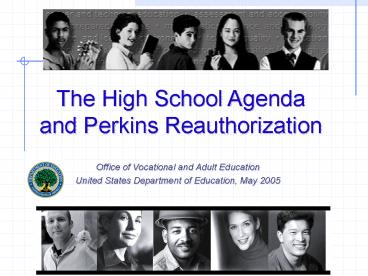Preparing Americas Future - PowerPoint PPT Presentation
1 / 15
Title:
Preparing Americas Future
Description:
United States Department of Education, May 2005 ... Disconnect Between Student Aspirations and High School Preparation. Students ... – PowerPoint PPT presentation
Number of Views:45
Avg rating:3.0/5.0
Title: Preparing Americas Future
1
The High School Agendaand Perkins
Reauthorization
Office of Vocational and Adult Education United
States Department of Education, May 2005
2
Fastest Growing Jobs Require Some Education
Beyond High School
3
Disconnect Between Student Aspirations and High
School Preparation
Students
Source NCES, The Condition of Education, 2000,
p. 151.
4
Every high school diploma must mean that our
graduates are prepared for jobs, for college,
and for success. President George W. Bush
5
American Diploma Project
- Successful preparation for both postsecondary
education and employment requires learning the
same rigorous English and mathematics content and
skills. No longer do students planning to go to
work after high school need a different and less
rigorous curriculum than those planning to go to
college.
6
President Bushs New Education Proposals, 2005
- 1.5 billion for High School Intervention and
State Assessments, includes. - 1.2 billion for flexible intervention funding
- 250 million High School Assessments in reading
and math, grades 9,10, and 11 - 200 million for the Striving Readers Initiative
- 269 million for Mathematics and Science
Partnership Program (120 million targeted for
math acceleration)
7
President Bushs New Education Proposals (continue
d)
- 125 million Community College Access Grants
- 52 million Expansion of Advanced Placement
(AP) programs - State Scholars expansion
- 1,000 Enhanced Pell Grants for State Scholars
participants - 500 phased-in Pell Grant increase
8
The Perkins Act Reauthorization Challenges for
modernizing Career Technical Education
9
Challenges for Modern CTE
- All youth need a high level of core academic
skills, regardless of their chosen educational
and career path. - Many high schools and traditional voc-ed are not
currently designed to meet this objective - Millions of adults currently in the workforce
also need to strengthen and acquire new academic
and technical skills. - Connections between high schools, college and
employers must be strengthened.
10
Perkins ReauthorizationKey Issues
- Accountability
- Link to NCLB Assessments (at the proficiency
level) and NCLB graduation rate methodology. - Require valid and reliable indicators.
- Indicators should not be solely developed by
states. - Link technical skills to recognized industry
standards. - Create separate secondary and postsecondary
indicators. - Require local accountability for results
11
Perkins ReauthorizationKey Issues
- Program Rigor
- Require states to identify a secondary academic
core that prepares for postsecondary education
and work readiness. - Define CTE, Tech Prep as culminating in a
postsecondary degree or recognized credential.
Dont water down postsecondary expectations. - Encourage Career Pathways/Model Sequence of
Courses. - Phase-out and merge Tech Prep into the general
program. - Allow linkages to baccalaureate programs but
target funds at secondary programs and
sub-baccalaureate programs.
12
Perkins ReauthorizationEmerging Consensus
- Career Pathway Programs
- (Model Sequence of Courses)
- Encourage linkages between high schools and
postsecondary institutions. - Includes a challenging academic core.
- Offers non-duplicative technical courses leading
to degree or certificate. - Focuses on career pathways that are in-demand and
lead to economic self-sufficiency. - Each local grant recipient operates at least one
career pathway program. - State helps develop and approves career pathways.
13
(No Transcript)
14
Perkins ReauthorizationLegislative Status
- H.R. 366. Introduced on 1/26/05
- Based closely on H.R. 4496 from the 108th
Congress. - Passed by the Committee on March 9, 2005.
- Awaiting full House action.
- S. 250. Introduced on 2/1/05
- Based closely on S. 2686 from the 108th Congress.
- Passed by Committee on March 9, 2005.
- Passed by the full Senate on March 10, 2005.
15
The High School Agendaand Perkins
Reauthorization
Office of Vocational and Adult Education United
States Department of Education, May 2005































